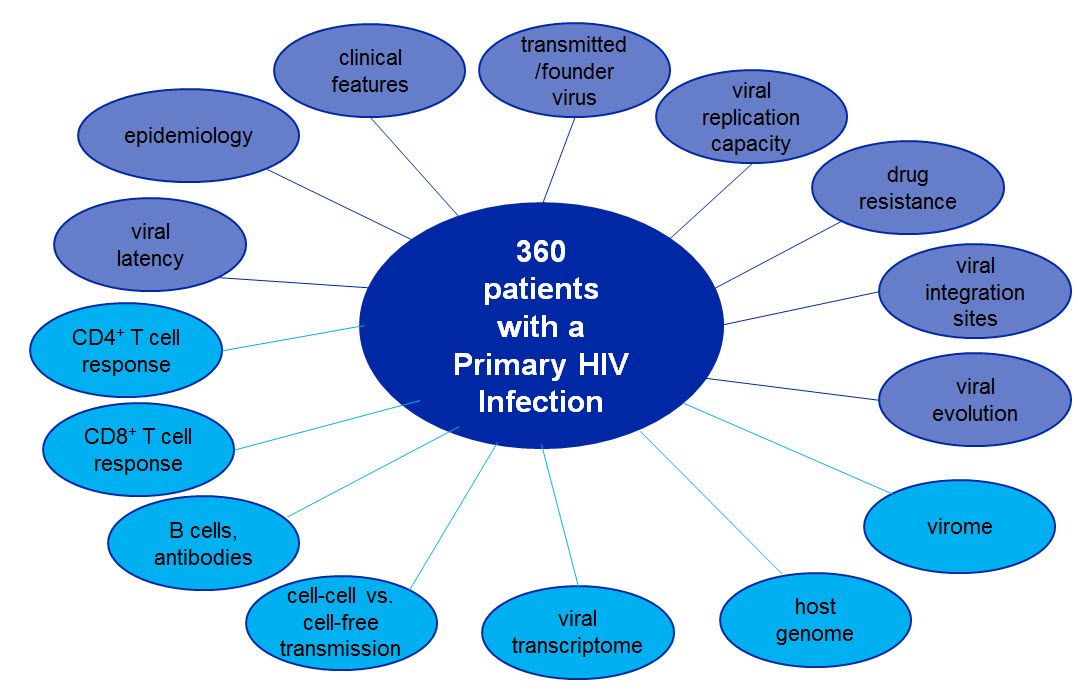Contact
Department of Infectious Diseases and Hospital Epidemiology
PD Dr. med Dominique Braun
Head of the Swiss HIV Cohort Center Zurich
University Hospital Zurich
Rämistrasse 100
8091 Zurich
Despite a considerable body of knowledge that has been accumulated over the past decades and major successes in the treatment of HIV infection, neither an effective vaccine nor an eradication of HIV by drug intervention are within reach.
Current antiretroviral treatment (ART) has dramatically reduced morbidity and development of AIDS in industrialized countries. To date however success of ART necessitates a life-long, continuous therapy as drug control the virus but cannot eliminate it form the latent reservoir. In order to control HIV-1 infection in the future, three main pillars are necessary: i) Optimal treatment of patients to control disease and limit transmission, ii) Resolving the underlying biology that leads to HIV latency to allow development of novel therapies leading to eradication of HIV from the infected individual (cure). iii) Defining protective immune responses against HIV to allow the development of effective vaccines. A key focus of research to reach these goals is the acute HIV infection as during this stage the latent reservoir is formed and the immune system is primed.
The research of acute HIV Infection is the key focus of the Zurich Primary HIV Infection Study (ZPHI). The ZPHI is an open label, non-randomized, observational, monocenter study at the University Hospital Zurich, Division of Infectious Diseases and Hospital Epidemiology and has been started at the beginning of 2002. The ZPHI is conducted by Prof. Huldrych Günthard. Since 2002, the ZPHI has enrolled more than 360 patients with a documented primary HIV infection (PHI). Recruitment of patients with a PHI into the ZPHI is ongoing. The ZPHI aims to describe the epidemiology of PHI, to longitudinally follow patients with a PHI, to test the effect of early antiretroviral treatment (ART) and to investigate clinical presentation and early events of virus-host interactions in patients with a documented PHI in Zurich.

The ZPHI belongs to the largest PHI studies in the western world, including well-described patients defined by using very strict PHI criteria. The ZPHI has published more than 50 original articles and reviews within the last ten years. The research platform of the ZPHI-study includes internationally renowned research groups within the areas of clinical infectious diseases, basic virology, immunology, genetics, evolution and bioinformatics research. Through this platform we have the possibility to perform innovative, pathogenesis-oriented clinical trials and basic research centering around HIV transmission, formation of the viral reservoir and its eradication. The platform further provides interesting training opportunities for master students (Medicine and Faculty of Science), PhD, MD-PhD students, postdocs and clinical researchers in different disciplines (microbiology, immunology, epidemiology / Biostatistics, Bioinformatics / Biomathematics, infectious diseases).

Department of Infectious Diseases and Hospital Epidemiology
PD Dr. med Dominique Braun
Head of the Swiss HIV Cohort Center Zurich
University Hospital Zurich
Rämistrasse 100
8091 Zurich